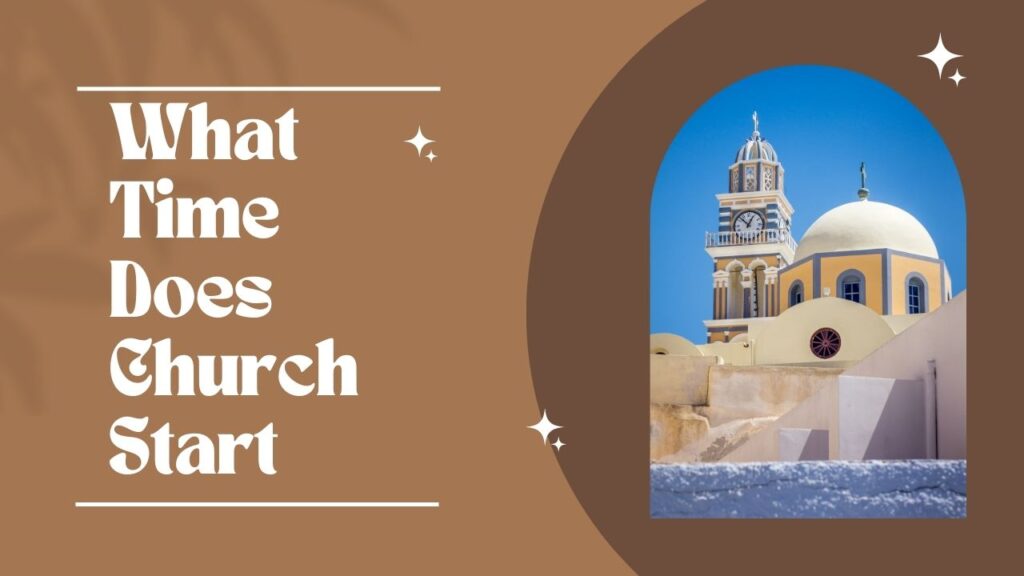
Contents
Worship Schedules Across Religious Traditions
What Time Does Church Start ? Timing church services is a key part of religious observance, reflecting both their rhythms and practices across various faith traditions. Churches, synagogues, mosques, temples and other places of worship frequently hold gatherings at specific times for prayerful contemplation or spiritual connection; we explore here how various traditions structure worship schedules with their unique starting times and why.
Christian Worship:
Christian churches throughout the world hold services on various days throughout the week, with Sunday being their central day for collective worship. A Sunday Service (or Mass for Catholicism or Service in Protestant denominations) serves as the main weekly gathering point for Christians worldwide and typically starts between 8:00 AM and 11:00 AM depending on which denomination.
Some Christian traditions also hold weekday services, like Wednesday evening prayer or Friday Stations of the Cross during Lent, to provide additional worship, reflection, and spiritual growth throughout each week. These weekly services allow worshipers to deepen their devotion, reflect, and spiritual growth throughout each week.
Jewish Worship:
In Judaism, Sabbath (Shabbat) is an annual day of rest and worship that starts on Friday at sunset and extends until nightfall Saturday evening. Jewish families typically gather on Friday evening to honor this sacred time through “Kabbalat Shabbat”, also referred to as welcoming or welcoming of Sabbath services which vary in start time depending on when sunset occurs but typically begin either shortly before or soon after it.
On Saturday mornings, Jewish communities gather together for “Shacharit”, their Sabbath morning prayer service. Starting time may vary according to local custom and sunrise time but often begins early so as to allow ample time for communal prayers and Torah readings.
Islamic Worship:
To practice Islam properly, Muslims practice daily prayers called Salat which serve as an integral act of worship. Muslims perform five obligatory prayers daily at specific times beginning with Fajr at dawn until sunset when Isha prayer (night prayer) takes place at fixed intervals throughout their day allowing Muslims to stay connected to God all throughout their day.
On Fridays, Muslims gather together in mosques for congregational Friday prayers (Jumu’ah), typically taking place shortly after noon and following their regular Friday sermon (Khutbah).
Hindu Worship:
Hinduism’s worship practices and timing can vary considerably according to regional and personal traditions, however many individuals perform their daily prayers (Puja) both morning after awakening (Nitya Karma) and in the evening shortly before sunset (Sandhyavandanam).
Hindus also gather for communal worship and rituals at temples and community centers, often times following centuries-old traditions or special celebrations of significance to each religion or community. Services may occur throughout the week at certain temples while festivals could last several weeks due to factors including tradition or significance of an occasion being honored.
Buddhist Worship and Meditation Practices:
Buddhist worship and meditation practices vary across schools and traditions, though most Buddhists begin their day with morning chanting or meditation known as Puja, to show devotion and gratitude towards Buddha, Dharma, and Sangha. Exact timing depends upon individual preferences as well as daily schedules.
Buddhist monastic communities typically host morning and evening ceremonies attended by both monks and lay practitioners, offering opportunities for collective meditation, teachings, and spiritual renewal.
Conclusion:
Church services and worship gatherings begin at different times across religious traditions, reflecting each religion’s practices, beliefs, and cultural environments. Worship schedules provide not only opportunities for communal prayer and spiritual connection; they also establish rhythms into believers’ lives that foster an atmosphere of devotion in religious communities. Whether its Sunday Mass, Jumu’ah prayer on Friday evenings, Shabbat services or any other sacred time; each holds great meaning for followers as moments for reflection, renewal and divine connection are shared together during worship gatherings.
Related Post – What Time Does Church Start ? What Time Does Church Start ? What Time Does Church Start ?
When Did Christianity Become the Dominant Religion in Europe









